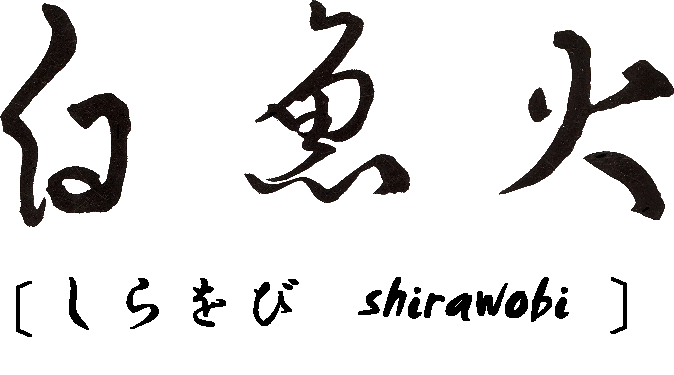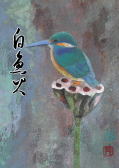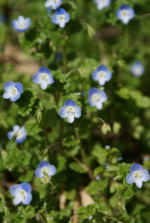| 最終更新日(update) '11.05.02 |
| 2011 |
 |
|
|
| ここに掲載の句は白魚火誌の“白魚火秀句”に掲載されたものの英訳です。 翻訳はホームページ担当者が行っていますので、作者の意に染まないところや名前の読み違いには直ぐに対応します。メール |
| Shirawobi is the name of a Haiku magazine and an association of Haiku enthusiasts that has existed for fifty years in Shimane Prefecture, Japan. The following Haikus are written by the members of the Shirawobi group, selected by its chairperson Mr. Masafumi Nio, and rendered into English by its web-site editor. The words in the single brackets are Haikus in Japanese and those in double brackets are the authors' names. |
|
|
|
|
| Haikus Selected from '11 January edition of the Shirawobi |
| to '11January Japanese page |
|
|
| (Ru no jyuukyo-ato no ishigaki sasago naku) ((Taguchi Kou)) the stone wall of ruin of exile's house... bush warbler in winter sings *In winter, bush warbler is not a good singer comparing with that of in spring and summer. (No no tsuyu ni sen-tou yuragu mushi-kuyou) ((Nozawa Fusayo)) many candles are flickering among dew on the grasses... mushi-kuyo* *Mushi-kuyo is a Buddhist service for the died bugs, worms and insects that were killed during farming in this year by lighting a thousand of candles and reciting sutra, in autumn.. (Akikaze ya on-na tegata wo kakeji to shi) ((Kodama Mizue)) Edo era's passport for woman was displayed on the hanging scroll... autumn wind (Dokushaku ya kumo ni oboruru jyuusanya) ((Higaki Henri)) I pour sake for myself-- clouds blur the moon on the thirteenth night (Shinsoba kuu tonari no kyaku wa hidarikiki) ((Ookubo Kifuu)) I eat buckwheat noodle in fall... the guest of next seat is left-handed (Oyako tote basho wa oshie zu kinoko tori) ((Kitamura Midori)) Even parent, I never tell the place... mushroom gathering (Tengan ni kuchi wo hiraki nu hana yatsude) ((Kuwana Kuni)) when I do eye drops I open my mouth too ... Japanese fatsia (Yamuhito ni kumiuchi soude de inekari su) ((Hirata Kumiyo)) a farmer was ill, all neighbors helped rice reaping |
|
|
| Haikus Selected from '11 February edition of the Shirawobi |
| to '11February Japanese page |
|
|
| (Kan-ari-sai naya ni yasume ru denki-noko) ((Watanabe Michiko)) Kan-ari-sai*-- an electric saw takes a rest in the storage barn *Kan-ari-sai: Jinzai-sai is a festival around izumo area. Several shrine hold the festival for a couple of weeks in November. This haiku may be written at Sata shrine. During the days, the local residents never make nor alterate fixtures and buildings. (Hi wa sase do nagaku wa tobe nu fuyu no chou) ((Morooka Hitoshi)) dispite sunshine... winter butterfly can not fly long (Kata-ashi ga okure te agaru hasune-hori) ((Murata Aiko)) another leg delays to be on the ground... digging lotus root (Ryouki kuru mizuumi ni shio koku sashi te) ((Nishimura Matsuko)) hunting season has come-- the tide of the lake is rising (Aoiro no enogu jyuuichi-gatsu no sora) ((Hayashi Hiroyo)) a tube of blue paint... November sky (Yama kasanari te nao oku ni yuki no mine) ((Tanaka Yuuki)) mountain lies upon another... a snowcapped one is hidden behind them (Niwa-teire tsurube-otoshi ni haka yuka nu) ((Tsuchiya Makoto)) gardening is making little progress due to tsurube-otoshi* *Tsurube-otoshi: we say the autumn sun sinks as quickly as s bucket falling into a well. (Hatsu-tabi wa ashi de koe taki iware-michi) ((Yamoto Akira)) I want to cross over Iware-pass on foot... on the first trip in this year *Iware is an old name of south area of Nara Prefecture, where has many historical stories in the age of the gods. |
|
|
| Haikus Selected from '11 March edition of the Shirawobi |
| to '11March Japanese page |
|
|
| (Yuzu-buro ya haha ni nakari shi hi wo kasane) ((Murakami Shouko)) the bath scented with yuzu-- I live in my old age my mother never had (Kannabi no kaze ni mukai te daiko hosu) ((Fujie Ryouko)) I dry Japanese white radishes* with the wind blows from the holy mountain *In winter, some farmers dry Japanese white radishes by exposing chilly and dry wind in order to make yellow pickled radishes. (gassho-ya robe no shihou no ara-mushiro) ((Anzawa Keiko) gasshozukuri house-- four straw mats are around the sunken hearth (Shita wo yaku atsusa mo chisou nebuka-jiru) ((Machida Hiroshi)) the hotter, the better... miso soup with leeks (Kantou no hiku toki nori no tachiagari) ((Watanabe Sachiko)) at the ebb of cold wave, seaweeds stand up (Umazuki to hitozuki no uma fuyu nukushi) ((Ishikawa Jyunko)) horsey man and friendly horse... a gentle winter day (Choudou made yuki kaku tsuma no ite yasushi) ((Aoto Shizuyo)) my husband shovels the snow of our driveway... I am peaceful |
|
|
| Haikus Selected from '11 April edition of the Shirawobi |
| to '11April Japanese page |
|
|
| (kenkyou wa umi ni mo arite yuki fure ri) ((Moriyama Nobuko)) the prefecture border is in the sea, too... snow was falling (Geba no fuda mukashi kara tatsu hatsu-moude) ((Fukuda Isamu)) New Year's visit to shrine-- the sign of dismout-from-horse is still on the gate (Kono miyuki warau hoka naku kaki ni keri) ((Mori Jyunko)) deep snow -- what I can do is only laughing at and shoveling it (Igossou no muko wo kakkomi te toshi no sake) ((Matsubara Masatoshi)) sitting around the obstinate son-in-law from Kochi... we drink New Year's sake (Hiroi taru inochi yorokobi toso iwau) ((Hirama Jyunichi)) I had a narrow escape... I drink special sake for the New year's Day (Soccer no jyuuban kobushi tsuki aguru) ((Saitou Ayako)) the soccer player, wearing number ten, raised his fist (Tategami wo tate ganjitsu no nami-gashira) ((Kurebayashi Kouichi)) wave of the New year's Day looks like horse's mane that ruffles up (Oya ni shika wakara nu nango kigi mebuku) ((Yamoto Akira)) the meanings of infant's words are only understood by her mother the trees begin to bud (Kaden naru zoni musume ni oshie keri) ((Karasawa Yukiko)) I showed my daughter how to cook our family's traditional zoni* *Zoni: soup containing rice cakes which is eaten on New Year's Day. (Hatsu-uma ni hito-hi cha wo tatsu kafuu kana) ((Wakabayashi Kouichi)) Hatsu-uma* day-- drinking tea is forbidden due to our family's tradition *Hatsu-uma is a festival day of inari-shrines all over Japan in February .Fushimi inari in Kyoto is the origin of inari-shurines. |
|
|
| Haikus Selected from '11 May edition of the Shirawobi |
||
| to '11May Japanese page | ||
|
|
||
| (Setsuzou no soushiage naru manako kana) ((Nishida Mikiko)) an image made of snow is finishing by putting eyes (Shichi-kaiki sakura no koro to kime ni keri) ((Motosugi Ikuyo)) the seventh anniversary service of my husband's death must be held in cherry blossom season (Hokorobi shi akebono-iro no hatsu-zakura) ((Yamamoto Yasue) the first cherry blossoms open with daybreak color (Oni-yarau ko wa karegare ni sumeru nari) ((Ikeda Toki)) Oni-yarai... my children live far *Oni-yarai:Tsuina sai is a traditional event at Shinto shrine in February. (Shikarare mo homerare mo sezu sotsugyou su) ((Hieda Shuumi)) my son has completed high school as an averege student (Fuki-miso ya tsuma ni tsukiau choko ippai) ((Tomosada Kuniko)) Fuki-miso-- I drink a small cup of Japanese sake with my husband (Ue shi ki no medachi kizase ri soegi nimo) ((Kamo Kouichi)) a nursary tree I planted began to bud... and the prop, too (Sugi-kafun dashinuke ni fuku tengu-kaze) ((Araki Tomoko)) cedar pollen suddenly blow down by whirlwind (Massaki ni ruri wo hiroguru inufuguri) ((Maeda Fukui)) inufuguri opens azure petals at first
|
||
|
|

